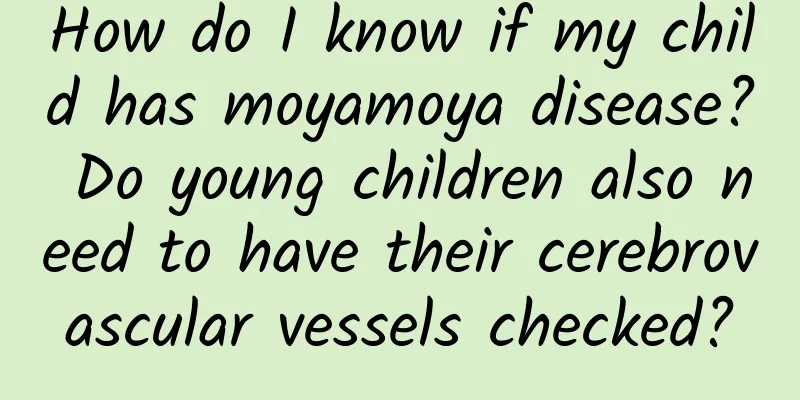How do I know if my child has moyamoya disease? Do young children also need to have their cerebrovascular vessels checked?

|
Many parents will worry about how to know whether their children are suffering from moyamoya disease at such a young age, and whether the examination will affect the child's intellectual development. Whether it is the one-year-old moyamoya disease patient who I operated on last year or the young patient who was admitted to the hospital this time, they were all diagnosed with moyamoya disease after the symptoms appeared. Last year, the child had a cerebral infarction and it was discovered that he had moyamoya disease. This time, the child lost consciousness and his upper limbs became stiff while crying. At first, I thought it was epilepsy. Later, he came to our hospital for a physical examination and auxiliary equipment examination before he was diagnosed with moyamoya disease. Generally, there is no need for children around one or two years old to have a special vascular check. After all, moyamoya disease is a rare disease. Although there is a chance of inheritance, the chance is very small. There are only tens of thousands of moyamoya disease patients in China with a population of more than one billion. Not everyone has such a high chance of developing the disease. It is recommended that parents observe their children's performance and conduct further examinations if abnormal symptoms occur. There are also things that the families of children with moyamoya disease should pay attention to. Children are not as easy to control their emotions as adults, and are more likely to cry and make a fuss. Once they are emotionally excited, they are prone to cerebral infarction. Do not feed children too hot food, which can also easily lead to cerebral infarction. For children with moyamoya disease, active surgery is critical, because in addition to facing a high risk of cerebral infarction, the child's brain is in the development stage, and long-term ischemia will lead to insufficient nutrients in the brain, which has a great impact on the development of the child's brain. Being in this situation for a long time is likely to lead to problems such as delayed memory and intellectual development of the child. At present, the one-year-old moyamoya disease patient has been successfully discharged from the hospital. The surgical treatment was very effective. I hope the child can grow up healthily in the future. |
>>: Do crayfish need to be deveined? (No, it won’t do any harm to the human body)
Recommend
What are the methods of breast massage?
Nowadays, due to the fast-paced life, many women ...
How many days are there in 7 weeks of pregnancy
7 weeks of pregnancy generally refers to 49 days ...
Treatment of post-coital bleeding
I believe that the disease of bleeding after inte...
How long after drinking Sprite can I breastfeed?
During breastfeeding, you can drink a small amoun...
What is the nutritional value of golden silk dates? How to choose golden silk dates
The flesh of golden thread jujube is thick and th...
Intervention and nutritional advice for malnutrition in children
Pediatric malnutrition is a health issue of wides...
Normal leucorrhea in early pregnancy
We all know that a series of changes will occur i...
What to do if the incision hurts after cesarean section
Cesarean section is a common choice for women to ...
After the Spring Festival, be careful of the "health killers" hidden in the refrigerator!
Before I knew it, the Spring Festival holiday was...
Do you need to stir millet porridge constantly when cooking it? Why do you need to stir millet porridge constantly with a spoon?
We all know that millet porridge is a common type...
How to treat uterine inflammation best
For patients with chronic endometritis or elderly...
What to eat to nourish your body after having an abortion
Abortion is the same as natural childbirth. There...
What does a woman's forehead light mean?
In ancient times, there was only one name on the ...
What should I do if I always have diarrhea during pregnancy?
The physical health of pregnant women will direct...
How to prevent adhesion after uterine curettage?
Curing is a very scary treatment for women. It is...









